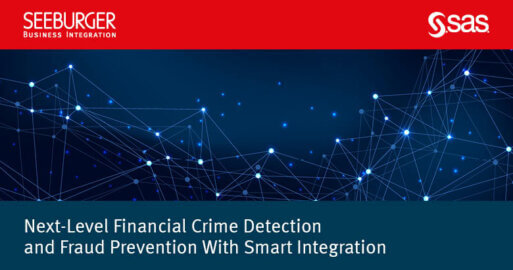Robust Data Ecosystem against Money Laundering & Financial Fraud

Do you know who your customers are? That may sound like a strange question, but in spite of stringent regulations regarding KYC (Know Your Customer) and KYB (Know Your Business) processes within organizations, the certainty around identity is still not as high as it should be. Particularly for the highly regulated financial sector, failing to authenticate identity carries the threat of heavy regulatory penalties and reputational repercussions. An efficient data ecosystem can help break valuable data out of organizational silos and unlock the power of identity verification. This not only shields organizations from financial losses but also ensures frictionless digital experiences for their customers. In this blog, we delve into the pivotal role of identity verification as a potent defense mechanism against old and emerging threats.
Know Your Customer (KYC) vs. Know Your Business (KYB)
No other industry is as heavily regulated as the financial services sector, and for good reason. When welcoming new customers or onboarding new business clients, banks must make certain that they are not unwittingly dealing with a criminal. Otherwise, they face severe penalties and reputational risks. Comprehensive KYC and KYB protocols ensure a robust foundation for compliance within the dynamic regulatory landscape of the financial industry.
The significance of KYC for financial institutions
Know your customer (KYC) is a set of procedures designed to verify and authenticate the identities of clients. This not only helps satisfy regulatory requirements but also acts as a shield against illicit activities like fraud, money laundering, etc. However, emerging technologies such as GenAI (generative AI) have made it easier than ever for people to engage in fraudulent activities, and the recent economic downturn has pushed many over the brink and into criminal activity. With this uptick in fraud and cyberattacks, KYC checks can become a resource-intensive burden for organizations, riddled with inefficient processes that require manual interventions. To make matters worse, valuable customer data that could be used for efficient KYC and anti-fraud measures is too often kept in silos and not shared within the institution, translating into wasted money and resources.
The significance of KYB for financial institutions
Know your business (KYB) refers to procedures aimed at understanding and validating the identities of business clients. Because of the size of the assets involved, fraudulent business clients can quickly have catastrophic consequences for financial institutions. Having comprehensive KYB processes in place creates transparency and instills trust in business relationships, while contributing to the resilience of the financial ecosystem. It is important to note, however, that KYB should not simply be lumped in with KYC. KYB poses its own unique challenges and should be its own discipline to ensure optimal outcomes.
Together, KYC and KYB create a robust ecosystem of due diligence that helps institutions assess the identities, backgrounds and legitimacy of both individual and corporate clients. This ensures regulatory compliance and creates a formidable defense against various forms of financial fraud, including identity theft, money laundering and other financial crimes.
Challenges in fraud and financial crime mitigation
Evolving tactics in fraud and financial crime
GenAI has changed the world we live in. It’s hardly surprising that the tactics of fraudsters are evolving alongside it. Although the large GenAI providers have put checks and regulations in place to prevent people from using their systems for nefarious purposes, ChatGPT & Co. have made it easier than ever to engage in fraudulent activities without any prior criminal knowledge. Black market AIs, often originating in countries without stringent regulations in place, offer ways to bypass these security measures altogether. Social engineering scams, in which fraudsters use stolen or faked identities, have skyrocketed with the advent of GenAI’s picture manipulation capabilities.
But there are also the classic scams, which don’t rely on technology, that we’ve been seeing for years, such as impersonation scams and money muling. These disproportionally affect the most vulnerable victims, especially when criminals approach the very young or unemployed to engage in small-scale criminal activities on their behalf.
Financial institutions must have one foot in both worlds, with classic fraud prevention measures targeting the kind of criminal activities we’re familiar with, as well as state-of-the-art detection methods that are capable of keeping up with the latest technological advancements.
Compliance with a complex regulatory landscape
Legislators are trying to stem the flood of financial fraud by constantly adjusting the regulatory landscape. Navigating this landscape of compliance rules and regulatory requirements adds further complexity for financial institutions already stretched thin. Particularly for smaller institutions, the cost of being compliant may mean they lack the funds to deliver in other areas, such as improved customer experience.
The challenge lies in not only keeping pace with existing regulations, but anticipating and preparing for coming regulatory shifts. Regulators have only just started tackling the emerging threats outlined above, but it is certain that this will create a plethora of new laws and regulations in the near future. This dynamic environment necessitates a robust compliance strategy, with comprehensive risk assessments, continuous monitoring and agile adaptation to regulatory changes.
The cost of manual processes and the limitations of legacy systems
The costs associated with manual processes and the constraints imposed by legacy systems continue to be another stumbling block for many institutions. The modern financial system produces almost incomprehensible amounts of data every single day. Humans are already incapable of addressing the sheer amount of KYC and KYB identity checks and false positives generated by dated systems within a reasonable amount of time. Add to that the fact that customers are more willing than ever before to switch banks if their customer experience is not as frictionless and immediate as they expect, and it becomes clear why banks are feeling the pressure.
A modern, best-of-breed data ecosystem that breaks up data silos and makes the data accessible for state-of-the-art fraud detection systems can help financial institutions address these pain points and deliver a frictionless customer experience while simultaneously speeding up KYC and KYB checks, staying ahead of regulatory requirements and minimizing the number of false positives flagged for human investigation.
The role of AML (Anti-Money Laundering) in fraud prevention
AML refers to the set of policies, procedures and regulations designed to detect and prevent the laundering of illegal money through legitimate financial channels, with one of the main concerns being terrorism financing. Financial Institutions who unwittingly enable such money laundering, usually through failures in their KYC/KYB due diligence, face not only reputational risks but also painful legal consequences, which can go as far as losing their business license altogether. Against this background, it becomes clear just why AML is so important for financial institutions – and why it also creates a formidable line of defense.
AML legislation is not just a bureaucratic hurdle – it is an essential safeguard that helps maintain the integrity of the financial system. Compliance with AML regulations involves thorough customer due diligence, monitoring transactions for suspicious activities and reporting such activities to the relevant authorities. This not only protects financial institutions from legal consequences, but it also fosters trust among customers and stakeholders.
Robust know your customer (KYC) and know your business (KYB) processes are crucial for a successful AML framework in financial institutions. The verification of the identities of individuals or businesses involved in financial transactions enables them to create comprehensive customer profiles, understand their financial behavior and identify any anomalies or red flags. This helps to improve the effectiveness of fraud prevention and AML measures, providing financial institutions with the tools to pinpoint suspicious activities, track the flow of funds and take prompt action to mitigate potential risks.
The Benefits of an Efficient Data Ecosystem
Data is the linchpin of a solid KYC and KYB architecture. The importance of high-quality and accurate data as the foundation for reliable decision-making and analysis cannot be stressed too much. It allows organizations to accurately identify and prevent potentially fraudulent activities, but also – and this is just as important! – prevent false positives that create the kind of choppy customer experience that will almost inevitably result in loss of business.
The power of ISO 20022 for a future-ready payments ecosystem
The move to ISO 20022 unlocks a wealth of transactional data from payments for banks. However, merely having the data isn’t enough: in order to profit from it, they need to invest in a coherent payments ecosystem that is able to read and process the data and understand the messages contained within it. Legacy systems and human workers are incapable of processing this data trove at scale and in the kind of real-time scenarios that modern banking processes need. Many banks have focused on doing the bare minimum to be just about ISO 20022-compliant, but in order to leverage the ISO 20022 data for efficient fraud prevention processes, they need to be more than just compliant: they need to be ready. Partnering with a trusted ecosystem integration provider can be the decisive factor in future-proofing their systems against fraud and AML.
Enhanced fraud detection and prevention
An efficient data ecosystem bolsters fraud detection and prevention measures by enabling real-time monitoring of transactions and the identification of irregularities and patterns. This allows organizations to intervene swiftly and stop financial crimes before they can escalate. The synergy of comprehensive data analytics and AML processes not only safeguards institutions from financial losses but also strengthens the overall integrity of the financial system.
Streamlined onboarding and due diligence processes
We have already seen that customers are more focused on a low-friction banking experience than ever before, particularly when forming relationships with new banking partners. However, onboarding is also one of the most critical processes for financial institutions in their fraud prevention program. They must try to identify and stop bad actors before they can engage in criminal activities, and yet the necessary background checks should impede the customer experience as little as possible. An efficient data ecosystem allows institutions to streamline onboarding and due diligence processes, ensuring a frictionless customer verification process in spite of comprehensive background checks. Harnessing the power of a well-organized data ecosystem allows for seamless cross-referencing of information for swift and accurate automated AML checks – significantly diminishing compliance costs.
Regulatory compliance and the future of fraud prevention
The advent of GenAI has shaken up the way people live and do business, wherever they may fall on the legal scale. Government legislators and regulatory bodies, often slow to respond to new challenges, are struggling to keep up with the speed at which the threat landscape is evolving. As financial fraud becomes more sophisticated and harder to detect, financial institutions’ safeguards against fraud and money laundering will have to follow suit – because legislators certainly will. And when they do, organizations may find they have to comply very quickly. If they don’t invest time and resources into a comprehensive, agile data ecosystem now to lay the foundation for tomorrow’s fraud prevention initiatives, they may struggle to catch up.
But while technologies such as AI no doubt pose threats, they also offer new opportunities. For example, banks can leverage AI-based algorithms for a level of granular pattern recognition at scale that vastly surpasses anything they were able to do until now, while simultaneously eliminating the human margin of error. By making sure that only truly suspicious accounts or transactions are flagged for human intervention, such systems can help ensure that the customer has a frictionless banking experience in real time while also saving human resources and improving risk mitigation success rates.
Best practices for implementing an efficient data ecosystem / How SEEBURGER can help
The implementation of an efficient data ecosystem has become a strategic imperative for financial institutions. Breaking valuable data out of silos and making it available in an agile architecture ensures adaptability in the face of an ever-evolving regulatory environment. The key to sustained compliance lies in continuous monitoring and updating of customer data to safeguard against emerging risks. Investing in staff training and awareness programs in order to foster a culture of vigilance and competence in handling sensitive data is equally important.
A strategic partnership with a trusted ecosystem integration platform provider such as SEEBURGER can help establish a strong foundation for reliable and accurate data processing. Our agile, secure and scalable BIS Platform enables modernization of business processes and reliable customer relationships.
From developing new business models to complying with changing regulatory requirements and rising customer expectations, we help the world’s largest banks and corporates process millions of transactions each day, supporting digitalization strategies and initiatives such as ISO 20022 migration, adding faster and smarter payment processing capabilities and achieving compliance. Gain agility, speed and the ability to respond quickly to market demands while proactively protecting yourself against tomorrow’s risks.
Brochure
Learn more about how a comprehensive data ecosystem can help you leverage AI for comprehensive financial crime mitigation:
Read nowThank you for your message
We appreciate your interest in SEEBURGER
Get in contact with us:
Please enter details about your project in the message section so we can direct your inquiry to the right consultant.
Written by: Ulf Persson
As SVP Strategic Product Management and Analyst Relations, Ulf is responsible for strategic product management, product marketing, global analyst relations and leadership with regards to SEEBURGER integration technology, platform and integration services. This also includes strategic sales and marketing initiatives. Ulf works across multiple industry verticals such as Financial Services/Payments, Automotive, Logistics, Utilities, Retail, CPG and Manufacturing. Ulf has more than 30 years of global business and technology experience working with product and solution delivery of integration technologies (EAI, EDI, B2B, MFT, API, etc.), Analytics and Big Data, Cloud Services, Digital Transformation and various industry initiatives. Before joining SEEBURGER in October 2016, Ulf worked in various global leadership roles with international business integration technology and cloud services providers.





